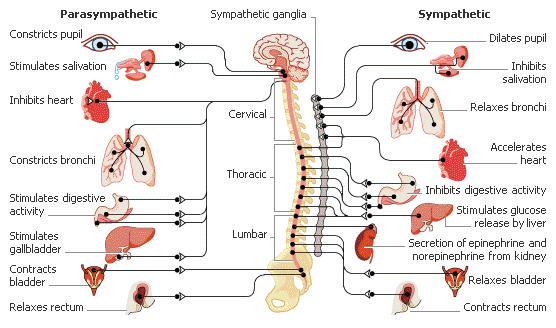
The Autonomic Nervous regulates the internal body processes that require no conscious awareness: for example, the rate of heart contractions, the rate of breathing, amount of stomach acid secreted, and the speed at which food passes through the digestive tract. We divide the Autonomic Nervous System into the Sympathetic and Parasympathetic sides and they can be easily thought of as our body’s gas pedal and brakes. The Sympathetic side relates to the speeding up of body processes, it responds to stresses both external and internal like infection, and at its extreme influence we are in what may be referred to as “fight or flight” mode which is our response to extremely stressful or emergency situations (like flooring the gas pedal). While the Sympathetic dominances is necessary, even life saving, at times, it prevents the proper operation of the Parasympathetic side which is equally important. Each of the two sides uses specific counterbalancing minerals and nutrients to fuel their controlling mechanisms. Think of Sympathetic dominance as an indicator for the need to supply the missing minerals and nutrients that support the opposite, Parasympathetic side – primarily alkaline ash minerals including Potassium. Too much acceleration means we need more brakes.
Sympathetic Dominance can be indicated by the presence of symptoms that both show a keyed up, hyper functioning, over-alertness, and an under-functioning of the Parasympathetic side such as poor digestion, difficulty relaxing or getting a good night’s sleep, racing or erratic pulse, or difficulty with bathroom functions. Sometimes people can have a Sympathetic and Parasympathetic Dominance which means your body has a difficult time maintaining balance between the two states; it swings like a pendulum between both extremes and indicates a need for nutritional support for both sides.
Primary indicators of Sympathetic Dominance symptoms:
| Acid foods upset | Get chilled often |
| “Lump” in throat | Dry mouth-eyes-nose |
| Pulse speeds after meal | Keyed up – fail to calm |
| Cut heals slowly | Gag easily |
| Unable to relax; startles easily | Extremities cold, clammy |
| Strong light irritates | Urine amount reduced |
| Heart pounds after retiring | “Nervous stomach” |
| Appetite reduced | Cold sweats often |
| Fever easily raised | Neuralgia-like pains |
| Staring, blinks little | Sour stomach often |
Nutrition is essential to overall health! Feeding the body properly keeps our systems working well and working together. A deficiency within one system may cause an array of issues throughout the body.
